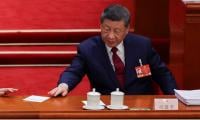The truth about pre-2013 transfer of votes
Viewpoint
By Ahmad Noorani
October 26, 2015
ISLAMABAD: After realizing that not a single vote registered in NA-122 in the electoral rolls of 2013 general elections has been transferred to some other constituency without proper application of the voter, the PTI is now confusing the votes transferred outside or in NA-122 and other constituencies before 2013 elections during door-to-door verification of voters.
The PTI leader Chaudhry Sarwar however says votes were transferred after 2013 elections ‘without the consent of voters’ and there were unavoidable evidences verifying the fact. He told the media that transfer of vote without consent of voter was a crime.
However, the Election Commission of Pakistan (ECP) says not a single vote registered in 2013 electoral rolls has been transferred to any other constituency without proper application as well as supported evidence of change of residence, property or employment.
It said even if a single vote of 2013 electoral rolls had been transferred without consent of voter, the PTI should come up with the name and CNIC number of such voter so that details and facts (about such voter(s) could be shared with the public on the basis of ECP record and Nadra computerized electoral rolls.
The commission officials say eight names and CNIC numbers provided so far through the media had proven fake as they were never registered in NA-122.
The computerized electoral rolls system not only has details of all 93 million registered voters, but also the scanned record of applications and evidences provided to ECP for change of votes.
According to the ECP officials, after 2008 elections there were great number of complaints from almost all political parties that tens of thousands of votes had been registered at wrong places, there were fake votes as well as there was duplication of votes.
Officials say to eradicate duplication of voters, computerized electoral rolls were prepared for the first time in the country’s history with the help and technical assistance of Nadra which eradicated all duplicate votes.
In addition to this, in line with the Supreme Court directions, it was decided that all voters will be verified by the ECP through door-to-door visits of voters’ homes so that all fake
voters could be deleted in the list as well as all voters can be registered at the right place of their choice.
Top ECP officials say 90 percent of total registered 85 million voters (number at that time in 2011 to 2012) were verified through this door-to-door exercise carried out by the ECP. However, 10 percent of these around 85 million voters could not be accessed on their given temporary or permanent addresses.
Officials say the right to franchise of these 10% voters could not be denied and thus after consultations with all political forces it was decided that these 10% unverified voters will be registered on the permanent address given in their CNICs.
ECP officials say through an extensive campaign on electronic and print media the public was informed about this decision and voters were asked to check their votes in the voting lists displayed at the offices of registration officers of their area, check online or by sending their CNIC on the ECP SMS Service ‘8300’ and if their vote is registered at a wrong place they can get it corrected by providing relevant documents and evidences to registration offices.
“Following this many voters got their votes transferred to their new place of residence by following the laid-down procedure,” an ECP officials said adding, “Still there were voters, very few in number, who remained unverified during the ECP’s door-to-door verification exercise and didn’t bother to check their votes in newly made computerized electoral rolls before 2013 elections and only came to know about this change on polling day in May 2013”.
Officials explain that majority of such voters got their vote transferred to their new and correct places right after 2013 elections.
ECP officials say the commission had great responsibility for correctly finalizing electoral rolls but voters also have some responsibilities in this regard.
There are multiple ways to check votes and any voter can check his/her vote 24 hours a day using ECP SMS Service and get it corrected by filing an objection or application to change the vote.
Officials say any voter who still claims that his vote was transferred without his consent is the voter who was not available on his given temporary or permanent addresses and could not be approached by the ECP during 2011-12 door-to-door verification exercise, he didn’t bother to check his vote through multiple sources available for the purpose following ECP’s repeated announcements in national media, he didn’t vote during 2013 general elections so could not notice transfer of his vote on his permanent address.
ECP officials insist, by providing all evidences, that not a single vote registered in 2013 electoral rolls has been transferred from one constituency to any other constituency without proper application of the voter along with all required evidences. And if there is any such voter, the ECP officials say, he must come forward or details of his registration in 2013 electoral rolls, his name and CNIC be shared so details of any of his transfer of vote could be made public.
ECP officials say while 10% votes were transferred to their permanent addresses, only few dozen were transferred to wrong permanent addresses because the Nadra database was showing a wrong permanent address.
They say in such cases, the voters could have approached the ECP offices to get their vote transferred to a latest and correct address.
Officials add even if any such mistake took place much before 2013 elections, no change or transfer of vote took place from 2013 electoral rolls without consent and proper application of the voter.
The PTI so far has failed to prove any such single vote registered in 2013 electoral rolls was transferred to a new constituency after 2013 elections “without the consent of the voter”.
The PTI leader Chaudhry Sarwar however says votes were transferred after 2013 elections ‘without the consent of voters’ and there were unavoidable evidences verifying the fact. He told the media that transfer of vote without consent of voter was a crime.
However, the Election Commission of Pakistan (ECP) says not a single vote registered in 2013 electoral rolls has been transferred to any other constituency without proper application as well as supported evidence of change of residence, property or employment.
It said even if a single vote of 2013 electoral rolls had been transferred without consent of voter, the PTI should come up with the name and CNIC number of such voter so that details and facts (about such voter(s) could be shared with the public on the basis of ECP record and Nadra computerized electoral rolls.
The commission officials say eight names and CNIC numbers provided so far through the media had proven fake as they were never registered in NA-122.
The computerized electoral rolls system not only has details of all 93 million registered voters, but also the scanned record of applications and evidences provided to ECP for change of votes.
According to the ECP officials, after 2008 elections there were great number of complaints from almost all political parties that tens of thousands of votes had been registered at wrong places, there were fake votes as well as there was duplication of votes.
Officials say to eradicate duplication of voters, computerized electoral rolls were prepared for the first time in the country’s history with the help and technical assistance of Nadra which eradicated all duplicate votes.
In addition to this, in line with the Supreme Court directions, it was decided that all voters will be verified by the ECP through door-to-door visits of voters’ homes so that all fake
voters could be deleted in the list as well as all voters can be registered at the right place of their choice.
Top ECP officials say 90 percent of total registered 85 million voters (number at that time in 2011 to 2012) were verified through this door-to-door exercise carried out by the ECP. However, 10 percent of these around 85 million voters could not be accessed on their given temporary or permanent addresses.
Officials say the right to franchise of these 10% voters could not be denied and thus after consultations with all political forces it was decided that these 10% unverified voters will be registered on the permanent address given in their CNICs.
ECP officials say through an extensive campaign on electronic and print media the public was informed about this decision and voters were asked to check their votes in the voting lists displayed at the offices of registration officers of their area, check online or by sending their CNIC on the ECP SMS Service ‘8300’ and if their vote is registered at a wrong place they can get it corrected by providing relevant documents and evidences to registration offices.
“Following this many voters got their votes transferred to their new place of residence by following the laid-down procedure,” an ECP officials said adding, “Still there were voters, very few in number, who remained unverified during the ECP’s door-to-door verification exercise and didn’t bother to check their votes in newly made computerized electoral rolls before 2013 elections and only came to know about this change on polling day in May 2013”.
Officials explain that majority of such voters got their vote transferred to their new and correct places right after 2013 elections.
ECP officials say the commission had great responsibility for correctly finalizing electoral rolls but voters also have some responsibilities in this regard.
There are multiple ways to check votes and any voter can check his/her vote 24 hours a day using ECP SMS Service and get it corrected by filing an objection or application to change the vote.
Officials say any voter who still claims that his vote was transferred without his consent is the voter who was not available on his given temporary or permanent addresses and could not be approached by the ECP during 2011-12 door-to-door verification exercise, he didn’t bother to check his vote through multiple sources available for the purpose following ECP’s repeated announcements in national media, he didn’t vote during 2013 general elections so could not notice transfer of his vote on his permanent address.
ECP officials insist, by providing all evidences, that not a single vote registered in 2013 electoral rolls has been transferred from one constituency to any other constituency without proper application of the voter along with all required evidences. And if there is any such voter, the ECP officials say, he must come forward or details of his registration in 2013 electoral rolls, his name and CNIC be shared so details of any of his transfer of vote could be made public.
ECP officials say while 10% votes were transferred to their permanent addresses, only few dozen were transferred to wrong permanent addresses because the Nadra database was showing a wrong permanent address.
They say in such cases, the voters could have approached the ECP offices to get their vote transferred to a latest and correct address.
Officials add even if any such mistake took place much before 2013 elections, no change or transfer of vote took place from 2013 electoral rolls without consent and proper application of the voter.
The PTI so far has failed to prove any such single vote registered in 2013 electoral rolls was transferred to a new constituency after 2013 elections “without the consent of the voter”.
-
 Nicole Kidman's Daughter Sunday Rose Under Intense Backlash Post-Keith Urban Divorce
Nicole Kidman's Daughter Sunday Rose Under Intense Backlash Post-Keith Urban Divorce -
 Teddi Mellencamp Reveals Medication Side-effects Landed Her In The Hospital
Teddi Mellencamp Reveals Medication Side-effects Landed Her In The Hospital -
 Chase Stokes Calls Out Morgan Evans Over Comments On Kelsea Ballerini Split
Chase Stokes Calls Out Morgan Evans Over Comments On Kelsea Ballerini Split -
 Elon Musk Says Legal Pressure Forced Him To Pay Full Price For Twitter
Elon Musk Says Legal Pressure Forced Him To Pay Full Price For Twitter -
 Sarah Ferguson’s Downfall & Housing Crisis: Pals Make A Decision On Radioactive Ex-Duchess
Sarah Ferguson’s Downfall & Housing Crisis: Pals Make A Decision On Radioactive Ex-Duchess -
 Taylor Swift Faces Awkward Situation Ahead Of Her Wedding To Travis Kelce
Taylor Swift Faces Awkward Situation Ahead Of Her Wedding To Travis Kelce -
 Anthropic, Pentagon Resume Talks On ‘high Stakes’ AI Defense Deal
Anthropic, Pentagon Resume Talks On ‘high Stakes’ AI Defense Deal -
 OpenAI Annualized Revenue Hits $25 Billion Milestone Amid Global Adoption Surge
OpenAI Annualized Revenue Hits $25 Billion Milestone Amid Global Adoption Surge -
 Princesses Beatrice, Eugenie’s Parents Hurt Their Future With William, Kate: ‘The Knives Are Out’
Princesses Beatrice, Eugenie’s Parents Hurt Their Future With William, Kate: ‘The Knives Are Out’ -
 Billy Porter Claims He Came Back From The Dead Amid Sepsis Battle
Billy Porter Claims He Came Back From The Dead Amid Sepsis Battle -
 Jason Dickinson Reportedly Headed To Oilers In Trade With Chicago Blackhawks
Jason Dickinson Reportedly Headed To Oilers In Trade With Chicago Blackhawks -
 Harry Styles Hints He's Ready For Marriage And Family Life
Harry Styles Hints He's Ready For Marriage And Family Life -
 David Harbour’s Ex Faced Extreme Humiliation At Lily Allen’s Producer's Birthday Bash
David Harbour’s Ex Faced Extreme Humiliation At Lily Allen’s Producer's Birthday Bash -
 China Targets Tech Innovations Amid High Stakes Rivalry With US: Key Strategies Explained
China Targets Tech Innovations Amid High Stakes Rivalry With US: Key Strategies Explained -
 Pacers Vs Clippers: Kawhi Leonard Powers Clippers Past Pacers For Third Straight Win
Pacers Vs Clippers: Kawhi Leonard Powers Clippers Past Pacers For Third Straight Win -
 Scientists Build Tiny AI Brain Model Using Monkey Neurone Data
Scientists Build Tiny AI Brain Model Using Monkey Neurone Data



